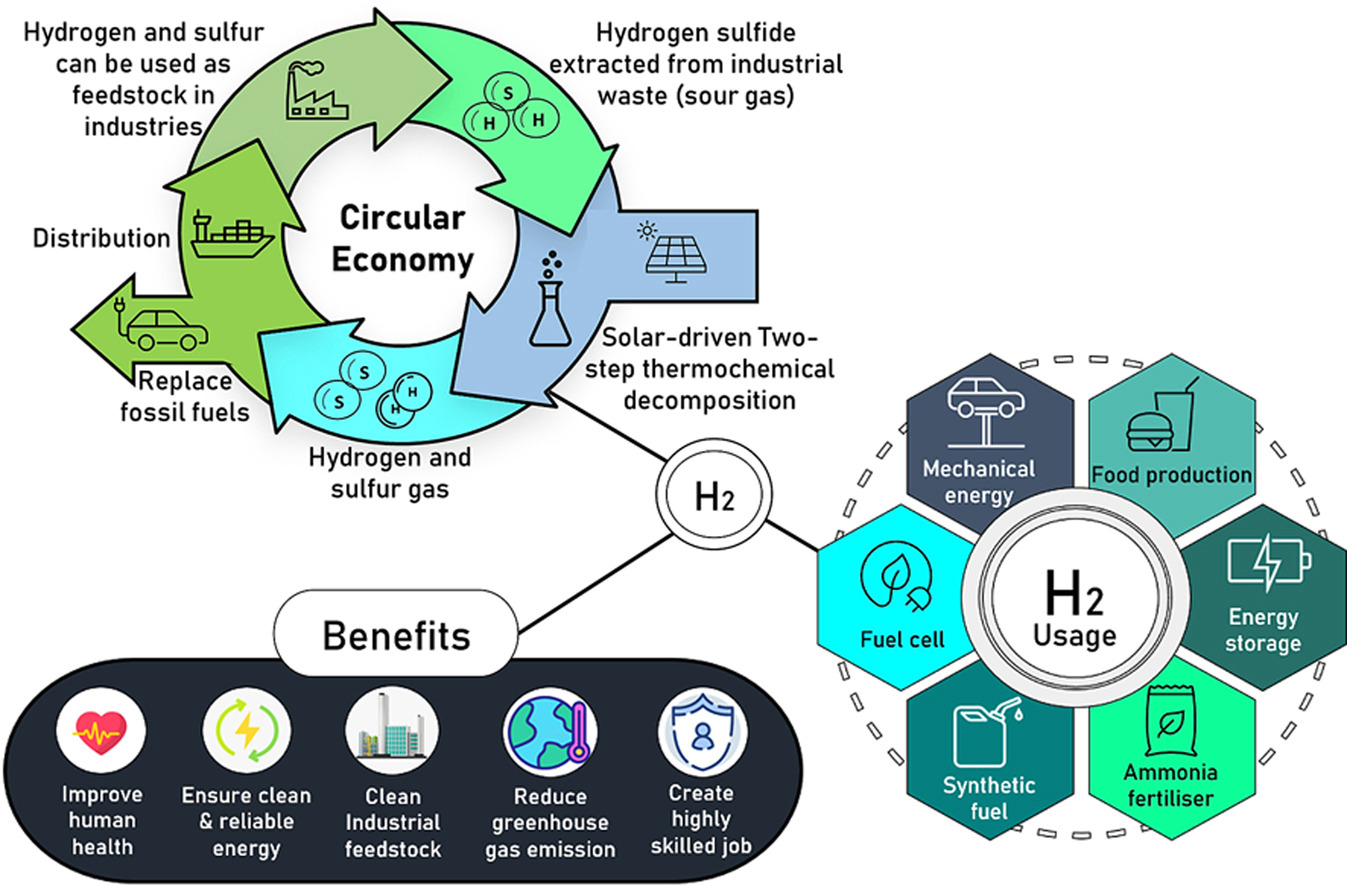
Hydrogen offers promise in decarbonization efforts with research from Khalifa University showing production from hydrogen sulfide powered by renewable energy a particularly green option
Hydrogen has emerged as a potential solution to the world’s energy needs because it is a cleaner alternative to traditional carbon-derived energy. With experts predicting a surge in demand, it is crucial to upscale the hydrogen economy and improve the performance of hydrogen-producing technologies.
A team of researchers including Khalifa University’s Dr. Khalid Al Ali, Associate Professor, and Asma al Blooshi, PhD student, conducted a comprehensive life-cycle assessment of a hydrogen sulfide-splitting model that replicates a pilot-scale plant. Their study focused on evaluating the environmental performance of the innovative two-step solar thermochemical process for hydrogen production.
By meticulously examining both the operational and construction phases of the pilot-scale plant, the research team aimed to provide valuable insights into the environmental implications of adopting this cutting-edge technology. Their findings underscored the pivotal role of renewable energy sources in mitigating the environmental footprint of hydrogen production, particularly through processes like electrolysis. Dr. Al Ali and Al Blooshi collaborated with researchers from Universiti Kebangsaan Malaysia, with their results published in the Journal of Cleaner Production, ranking among the top 1% of journals in the field.
Hydrogen can be produced from various sources. Almost 47 percent of the world’s hydrogen is produced from natural gas, 27 percent from coal, 22 percent from oil, and around 4 percent from electrolysis. Each technology varies in terms of its economic and environmental performance, depending on factors such as emission rates and the costs associated with its construction and operation.
“The global landscape of hydrogen production is diverse, with natural gas, coal, and oil being the primary sources,” Dr. Al Ali says. “However, the environmental footprint of these methods has sparked a search for greener alternatives. Electrolysis, powered by renewable energy, is a promising solution with some economic hurdles, but continuous advancements in research and technology will make green hydrogen a viable, cost-effective option.”
Hydrogen sulfide is a by-product of the oil and gas industry and can be converted to hydrogen through various processes such as thermochemical decomposition. This gas, often referred to as “sour gas,” poses significant environmental and safety challenges due to its toxic and corrosive nature. Converting hydrogen sulfide into hydrogen not only mitigates environmental pollution but also offers a valuable opportunity for energy recovery. However, the research team concluded that powering the process with renewable energy would further reduce the environmental impact, enhancing the sustainability of hydrogen production from hydrogen sulfide. Through innovative technologies like solar thermochemical processes, hydrogen production can be achieved more sustainably, contributing to the transition towards a cleaner and more efficient energy landscape.
“Our study assesses the environmental performance of producing hydrogen from a waste product such as hydrogen sulfide,” Dr. Al Ali says. “The process is powered by solar energy as it is economically and environmentally advantageous compared to processes powered by electricity from the grid. It is essential to assess emerging technologies such as this using life-cycle assessment to determine the environmental performance. Apart from producing hydrogen as an alternative clean-energy carrier, treating hydrogen sulfide also greatly lessens the environmental burden, especially its impact on human health.”
Despite the promising advancements highlighted by the team’s study, challenges remain in the journey toward a sustainable hydrogen economy. The high energy requirements for hydrogen production, the need for further research on alternative catalysts, and the imperative of addressing economic and social sustainability dimensions remain critical areas for future research, according to the research team.
“As a greener alternative to fossil-fuel derived energy, hydrogen as an energy carrier is one of the most feasible ways to progress towards decarbonization,” Dr. Al Ali says. “Our analysis shows that wind-powered thermochemical hydrogen sulfide splitting shows a reduced environmental load. We also concluded that in order for electricity generated from renewable sources to be more practical, the negative effects on human health must be reduced. Future studies should concentrate on the economic, social, and energy issues that are fundamental to sustainability.”
Jade Sterling
Science Writer
28 March 2024